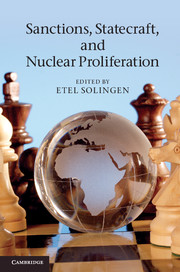Book contents
- Frontmatter
- Contents
- Figures
- Tables
- Contributors
- Preface and acknowledgments
- Part I Anatomy of inducements
- Part II Competing perspectives
- 5 An analytically eclectic approach to sanctions and nonproliferation
- 6 Threats for peace?
- Part III Reassessing the record: focused perspectives
- Part IV Conclusions: understanding causal mechanisms and policy implications
- 10 Ten dilemmas in nonproliferation statecraft
- References
- Index
- References
10 - Ten dilemmas in nonproliferation statecraft
Published online by Cambridge University Press: 05 June 2012
- Frontmatter
- Contents
- Figures
- Tables
- Contributors
- Preface and acknowledgments
- Part I Anatomy of inducements
- Part II Competing perspectives
- 5 An analytically eclectic approach to sanctions and nonproliferation
- 6 Threats for peace?
- Part III Reassessing the record: focused perspectives
- Part IV Conclusions: understanding causal mechanisms and policy implications
- 10 Ten dilemmas in nonproliferation statecraft
- References
- Index
- References
Summary
In dealing with those nations that break rules and laws, I believe that we must develop alternatives to violence that are tough enough to change behavior – for if we want a lasting peace, then the words of the international community must mean something. Those regimes that break the rules must be held accountable. Sanctions must exact a real price. Intransigence must be met with increased pressure – and such pressure exists only when the world stands together as one. One urgent example is the effort to prevent the spread of nuclear weapons, and to seek a world without them … It is also incumbent upon all of us to insist that nations like Iran and North Korea do not game the system. Those who claim to respect international law cannot avert their eyes when those laws are flouted. Those who care for their own security cannot ignore the danger of an arms race in the Middle East or East Asia. Those who seek peace cannot stand idly by as nations arm themselves for nuclear war … I know that engagement with repressive regimes lacks the satisfying purity of indignation. But I also know that sanctions without outreach – and condemnation without discussion – can carry forward a crippling status quo. No repressive regime can move down a new path unless it has the choice of an open door. (President Barack Obama, Peace Prize Speech, Oslo 2010)
Few topics are as critical to peace and international security as is nuclear proliferation. The illegitimate pursuit of nuclear weapons featured prominently as a justification for going to war in Iraq and will likely remain a crucial challenge for any administration grappling with the future of the Middle East, East Asia, and beyond. President Obama’s Nobel Prize speech echoes the view that different proliferation cases entail different responses; that sanctions must be biting but a door to dialogue should remain open; and that collective action (coordination across senders) is key. A remarkable speech that in many ways reflects state of the art thinking about statecraft in the early twenty-first century, it also mirrors some of the outstanding quandaries facing the international community in its effort to stem nuclear proliferation. This concluding chapter highlights ten crucial dilemmas in nonproliferation statecraft.
- Type
- Chapter
- Information
- Sanctions, Statecraft, and Nuclear Proliferation , pp. 297 - 351Publisher: Cambridge University PressPrint publication year: 2012
References
- 2
- Cited by



